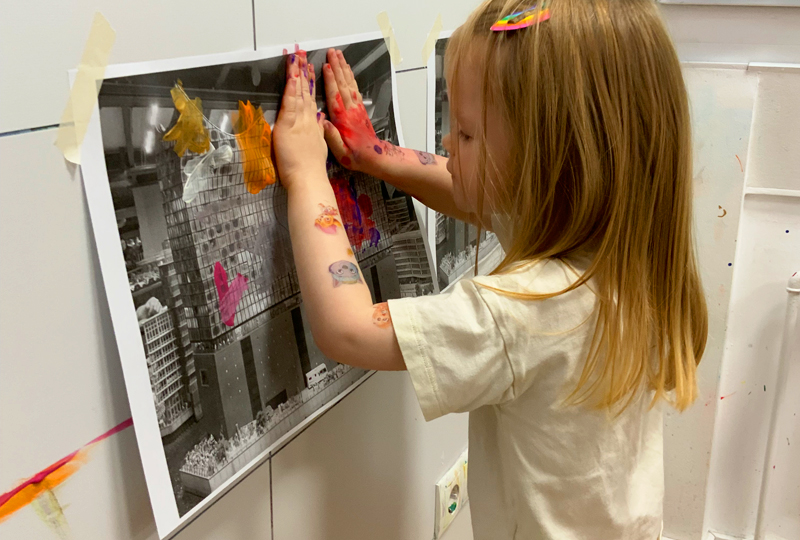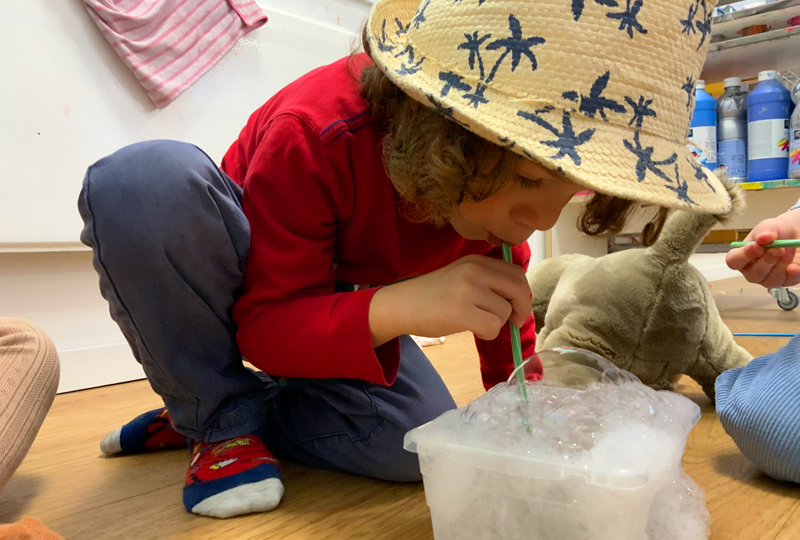Ava – A Children's Oasis in Uhlenhorst
Located at Averhoffstraße 38, with access from Winterhuder Weg, our Ava center is a beautifully renovated, bright facility offering 75 children a wonderful space with a spacious garden.
On the ground floor, you'll find the infant rooms for 30 children and the children's dining area. Our room-within-a-room concept provides the children with the flexibility to meet their needs throughout the day.
The infant area welcomes children with a cozy reading nook. From there, they move to the exploration corner and the studio. Next is the building area and the children's apartment. The movement room also serves as a nap area. Additionally, there is a music room featuring a piano and various other instruments. Floor-to-ceiling windows, which also function as terrace doors, give the children direct access to the garden.
For the 45 preschool children, there are two spacious care rooms. In the role-play room, children can enjoy a reading area, a theater, an apartment, and two changeable spaces.
The heart of our facility is our large studio, which invites children to engage in creative activities, experiment, and express themselves, and also features a building area.
Preschool children can visit the outdoor area at any time to satisfy their need for physical activity. The large garden offers fresh air and space for movement, providing a tranquil oasis away from the bustling city life of Hamburg Meile, U-Bahn Mundsburg, and the Alster. A nearby sports field, which our children can use, adds to the amenities. Our doors are open Monday through Friday from 7:30 AM to 5:00 PM. For any questions, please contact our educational director, Kevin, at 040/226 335 35 or use the contact form.
Lorenzini Art Daycare Center Ava is conveniently located near the following Hamburg districts: Uhlenhorst, Hamburg Meile, Mundsburg, Barmbek-Süd, Hohenfelde, Alster, Eilbek, Hamburg Street, Winterhuder Weg, Winterhude, Jarrestadt, Stadtpark, and Harvestehude.
Contact us now!Location
Lorenzini Kunst-Kita Averhoffstraße GmbH
Averhoffstraße 38 · 22085 Hamburg
Access from Winterhuder Weg
Contact
Email: ava@kunst-kita.de
Phone: 040 / 22 63 35 35
Spaces Available
30 Infant Spots
45 Preschool Spots
Opening Hours
Monday to Friday: 7:30 AM - 5:00 PM

Daten von OpenStreetMap - Veröffentlicht unter ODbL
Leadership

Kevin Diener
Head of Education
For me, workshop pedagogy in an open environment is the key to lived participation.

Ida Lange
Deputy Head
It is especially important to me to create a welcoming place where children, parents, and staff interact on equal terms. Appreciation for both young and old should be the foundation for a successful collaboration.
Education, Connection, and Loving Care ...
... for a successful start in the infant program!
In our five locations, we care for about 30 infants aged one to three years in each facility, with a staff-to-child ratio of one educator for every five infants.
When children join us, they are acclimatized using the Berlin model, as our primary goal is to create a strong and secure bond between the educator and the child. A sense of security and familiarity lays the foundation for enjoyable and effective educational work. The Berlin model involves a gentle acclimatization process with the participation of a parent and the future primary caregiver. Initially, the child visits the center briefly and with a parent, gradually increasing their time at the center over the following days and weeks. This process leads to a reliable and positive attachment. Our acclimatization process typically lasts around four weeks.
Learn more!
Did you know ...
-
... that it can be beneficial for children to attend a daycare or childcare service from as early as their first birthday? At this age, children start engaging more with their surroundings and begin to explore their environment in a curious manner.
-
... that children benefit from starting daycare early? Being in a group with children from diverse social backgrounds promotes healthy development. In the daycare environment, children quickly learn to be part of a community, understand the importance of waiting and patience - an essential social skill for life. Additionally, children who attend daycare tend to have more self-confidence compared to those who are cared for at home.
-
... that learning can happen simply by observing and watching other children play?
-
... that at home, children are often "in the background"? They may accompany a parent when they go shopping, cook, work, or do other activities, but the amount of time spent solely focused on the child is relatively short. In contrast, a daycare day is filled with experiences like playing, singing, and crafting - activities specifically designed for children, which parents at home might not be able to provide.
As you can see, we think carefully about how best to support your child’s development. You can find more details in our educational concept. 😉
We Foster Creativity and Cognitive Skills in Preschool Children
We love art. However, our clear identity as the original Hamburg Art Daycare Center is not an end in itself. While early engagement with art and creativity is a lot of fun, it is through the Reggio Emilia approach that children learn to educate themselves, laying the foundation for lifelong learning, academic achievement, and ultimately, career success.
In our preschool rooms, the consistent implementation of the room-within-a-room concept offers numerous opportunities for play, exploration, and learning. With areas such as a building corner, stage, reading lounge, mini-apartment, and a Montessori- style play area, we provide an excellent framework for self-directed education. Children can choose between their need for activity or quiet and engage with the changing educational offers from our educators according to their own interests.
Learn More!
Our Educational Concept ...
... proven and structured!
Loris Malaguzzi, founder of the Reggio Emilia approach, writes in his poem “The Hundred Languages of Children” that a child has a hundred languages, a hundred hands, a hundred ways of thinking, speaking, and playing, a hundred worlds to discover, a hundred worlds to dream.
Our goal is to preserve this diversity of languages, thoughts, approaches, and dreams while addressing the risk that a child’s innate openness might be overshadowed by the often one-sided influences of society.
The Reggio Emilia approach is based on the belief that every child is capable of self- education and interaction within a social context from the very beginning. Children are thus the architects of their own reality and development. The community acts as a co- constructor, and the environment plays a crucial role as the "third educator." The spaces within the center function as a rich environment, offering children both stimulation and challenges as well as comfort and opportunities for retreat.
Learn more!




















